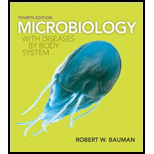
Microbiology with Diseases by Body System (4th Edition)
4th Edition
ISBN: 9780321918550
Author: Robert W. Bauman Ph.D.
Publisher: PEARSON
expand_more
expand_more
format_list_bulleted
Concept explainers
Question
Chapter 6, Problem 4FIB
Summary Introduction
Introduction:
Growth factors are substances which are available in nature. For example, vitamins are growth factors needed for stimulating the growth of the microbial cells. These are additional requirements apart from the major nutrients like carbon, hydrogen, nitrogen, and so on.
Expert Solution & Answer
Want to see the full answer?
Check out a sample textbook solution
Students have asked these similar questions
Which evidence-based stress management techniques are most effective in reducing chronic stress and supporting college students’ academic success?
students in a science class investiged the conditions under which corn seeds would germinate most successfully. BAsed on the results which of these factors appears most important for successful corn seed germination.
I want to write the given physician orders in the kardex form
Chapter 6 Solutions
Microbiology with Diseases by Body System (4th Edition)
Ch. 6 - Why should cardiac nurses and respiratory...Ch. 6 - Cavities Gone Wild Five-year-old Daniel appears to...Ch. 6 - Why do clinical laboratory scientists keep many...Ch. 6 - Boils in the Locker Room For several weeks,...Ch. 6 - Some students transfer some gunk from a 2-week-old...Ch. 6 - Which of the following can grow in a Petri plate...Ch. 6 - In the laboratory, a sterile inoculating loop is...Ch. 6 - Superoxide dismutase _____________. a. causes...Ch. 6 - The most reactive of the four toxic forms of...Ch. 6 - Microaerophiles that grow best with a high...
Ch. 6 - Prob. 6MCCh. 6 - Organisms that preferentially may thrive in icy...Ch. 6 - Prob. 8MCCh. 6 - Which of the following terms best describes an...Ch. 6 - In a defined medium, ______________. a. the exact...Ch. 6 - Which of the following is most useful in...Ch. 6 - Which of the following methods is best for...Ch. 6 - A Coulter counter is a(n) ________________. a....Ch. 6 - Lyophilization can be described as ___________. a....Ch. 6 - Quorum sensing is _____________. a. the ability to...Ch. 6 - Prob. 1FIBCh. 6 - Prob. 2FIBCh. 6 - Prob. 3FIBCh. 6 - Prob. 4FIBCh. 6 - Prob. 5FIBCh. 6 - Fill in the Blanks 6. Cells that shrink in...Ch. 6 - Fill in the Blanks 7. Obligate ________ exist in...Ch. 6 - Prob. 8FIBCh. 6 - Fill in the Blanks 9. Microbes that reduce N2 to...Ch. 6 - Fill in the Blanks 10. A student observes a...Ch. 6 - Fill in the Blanks 11. Chemolithotrophs acquire...Ch. 6 - Prob. 1VICh. 6 - Prob. 2VICh. 6 - High temperature affects the shape of particular...Ch. 6 - Support or refute the following statement:...Ch. 6 - Explain quorum sensing, and describe how it is...Ch. 6 - Why must media, vessels, and instruments be...Ch. 6 - Why is agar used in microbiology?Ch. 6 - What is the difference between complex media and...Ch. 6 - Draw and label the four distinct phases of a...Ch. 6 - If there are 47 cells in 1 l of sewage, how many...Ch. 6 - Prob. 9SACh. 6 - Prob. 10SACh. 6 - Explain the differences among photoautotrophs,...Ch. 6 - Contrast the media described in Tables 6.3 and 6.4...Ch. 6 - How does a chemostat maintain a constant...Ch. 6 - A scientist describes an organism as a...Ch. 6 - Pasteurization is a technique that uses...Ch. 6 - Two cultures of a facultative anaerobe are grown...Ch. 6 - Some organisms require riboflavin (vitamin B2) to...Ch. 6 - A scientist inoculates a bacterium into a complex...Ch. 6 - How can regions within biofilms differ in their...Ch. 6 - A scientific article describes a bacterium as an...Ch. 6 - Prob. 8CTCh. 6 - Prob. 9CTCh. 6 - Starting with 10 bacterial cells per milliliter in...Ch. 6 - Suppose you perform a serial dilution of 0.1-ml...Ch. 6 - How might the study of biofilms benefit humans?Ch. 6 - The filamentous bacterium Beggiatoa gets its...Ch. 6 - Given that Haemophilus ducreyi is a...Ch. 6 - Examine the graph in Figure 6.3. Note that the...Ch. 6 - Prob. 16CTCh. 6 - Using the terms in Figure 6.8a, describe the...Ch. 6 - Prob. 18CTCh. 6 - Prob. 19CTCh. 6 - Prob. 20CTCh. 6 - Prob. 21CTCh. 6 - Prob. 22CTCh. 6 - Viable plate counts are used to estimate...Ch. 6 - Prob. 1CM
Knowledge Booster
Learn more about
Need a deep-dive on the concept behind this application? Look no further. Learn more about this topic, biology and related others by exploring similar questions and additional content below.Similar questions
- Amino Acid Coclow TABle 3' Gly Phe Leu (G) (F) (L) 3- Val (V) Arg (R) Ser (S) Ala (A) Lys (K) CAG G Glu Asp (E) (D) Ser (S) CCCAGUCAGUCAGUCAG 0204 C U A G C Asn (N) G 4 A AGU C GU (5) AC C UGA A G5 C CUGACUGACUGACUGAC Thr (T) Met (M) lle £€ (1) U 4 G Tyr Σε (Y) U Cys (C) C A G Trp (W) 3' U C A Leu בוט His Pro (P) ££ (H) Gin (Q) Arg 흐름 (R) (L) Start Stop 8. Transcription and Translation Practice: (Video 10-1 and 10-2) A. Below is the sense strand of a DNA gene. Using the sense strand, create the antisense DNA strand and label the 5' and 3' ends. B. Use the antisense strand that you create in part A as a template to create the mRNA transcript of the gene and label the 5' and 3' ends. C. Translate the mRNA you produced in part B into the polypeptide sequence making sure to follow all the rules of translation. 5'-AGCATGACTAATAGTTGTTGAGCTGTC-3' (sense strand) 4arrow_forwardWhat is the structure and function of Eukaryotic cells, including their organelles? How are Eukaryotic cells different than Prokaryotic cells, in terms of evolution which form of the cell might have came first? How do Eukaryotic cells become malignant (cancerous)?arrow_forwardWhat are the roles of DNA and proteins inside of the cell? What are the building blocks or molecular components of the DNA and proteins? How are proteins produced within the cell? What connection is there between DNA, proteins, and the cell cycle? What is the relationship between DNA, proteins, and Cancer?arrow_forward
- please fill in the empty sports, thank you!arrow_forwardIn one paragraph show how atoms and they're structure are related to the structure of dna and proteins. Talk about what atoms are. what they're made of, why chemical bonding is important to DNA?arrow_forwardWhat are the structure and properties of atoms and chemical bonds (especially how they relate to DNA and proteins).arrow_forward
- The Sentinel Cell: Nature’s Answer to Cancer?arrow_forwardMolecular Biology Question You are working to characterize a novel protein in mice. Analysis shows that high levels of the primary transcript that codes for this protein are found in tissue from the brain, muscle, liver, and pancreas. However, an antibody that recognizes the C-terminal portion of the protein indicates that the protein is present in brain, muscle, and liver, but not in the pancreas. What is the most likely explanation for this result?arrow_forwardMolecular Biology Explain/discuss how “slow stop” and “quick/fast stop” mutants wereused to identify different protein involved in DNA replication in E. coli.arrow_forward
arrow_back_ios
SEE MORE QUESTIONS
arrow_forward_ios
Recommended textbooks for you
 Biology 2eBiologyISBN:9781947172517Author:Matthew Douglas, Jung Choi, Mary Ann ClarkPublisher:OpenStax
Biology 2eBiologyISBN:9781947172517Author:Matthew Douglas, Jung Choi, Mary Ann ClarkPublisher:OpenStax Biology: The Unity and Diversity of Life (MindTap...BiologyISBN:9781305073951Author:Cecie Starr, Ralph Taggart, Christine Evers, Lisa StarrPublisher:Cengage Learning
Biology: The Unity and Diversity of Life (MindTap...BiologyISBN:9781305073951Author:Cecie Starr, Ralph Taggart, Christine Evers, Lisa StarrPublisher:Cengage Learning Biology: The Unity and Diversity of Life (MindTap...BiologyISBN:9781337408332Author:Cecie Starr, Ralph Taggart, Christine Evers, Lisa StarrPublisher:Cengage Learning
Biology: The Unity and Diversity of Life (MindTap...BiologyISBN:9781337408332Author:Cecie Starr, Ralph Taggart, Christine Evers, Lisa StarrPublisher:Cengage Learning Anatomy & PhysiologyBiologyISBN:9781938168130Author:Kelly A. Young, James A. Wise, Peter DeSaix, Dean H. Kruse, Brandon Poe, Eddie Johnson, Jody E. Johnson, Oksana Korol, J. Gordon Betts, Mark WomblePublisher:OpenStax College
Anatomy & PhysiologyBiologyISBN:9781938168130Author:Kelly A. Young, James A. Wise, Peter DeSaix, Dean H. Kruse, Brandon Poe, Eddie Johnson, Jody E. Johnson, Oksana Korol, J. Gordon Betts, Mark WomblePublisher:OpenStax College Nutrition: Concepts and Controversies - Standalo...Health & NutritionISBN:9781305627994Author:Frances Sizer, Ellie WhitneyPublisher:Brooks Cole
Nutrition: Concepts and Controversies - Standalo...Health & NutritionISBN:9781305627994Author:Frances Sizer, Ellie WhitneyPublisher:Brooks Cole

Biology 2e
Biology
ISBN:9781947172517
Author:Matthew Douglas, Jung Choi, Mary Ann Clark
Publisher:OpenStax

Biology: The Unity and Diversity of Life (MindTap...
Biology
ISBN:9781305073951
Author:Cecie Starr, Ralph Taggart, Christine Evers, Lisa Starr
Publisher:Cengage Learning

Biology: The Unity and Diversity of Life (MindTap...
Biology
ISBN:9781337408332
Author:Cecie Starr, Ralph Taggart, Christine Evers, Lisa Starr
Publisher:Cengage Learning


Anatomy & Physiology
Biology
ISBN:9781938168130
Author:Kelly A. Young, James A. Wise, Peter DeSaix, Dean H. Kruse, Brandon Poe, Eddie Johnson, Jody E. Johnson, Oksana Korol, J. Gordon Betts, Mark Womble
Publisher:OpenStax College

Nutrition: Concepts and Controversies - Standalo...
Health & Nutrition
ISBN:9781305627994
Author:Frances Sizer, Ellie Whitney
Publisher:Brooks Cole